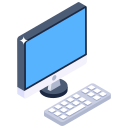What is a Computer?
A computer is an electronic machine that accepts raw data as input and processes it with CPU to produce the result as output. It is a Latin word and it drives from “computare” which means to calculate. In 1837 Charles Babbage invented Analytical Engine. It is considered as the first system. That’s why Charles Babbage is also known as the father of the computer. This Analytical Engine machine uses the punch cards as read-only memory. It understands the binary (0, 1) language. That’s why it is also known as machine language. It is a programmable machine. It executes the programs through hardware. The alternative words for a computer may use like Machine, System, etc.
Basic Parts Of Machine For Working
- Processor: It executes instructions given from software on hardware. It is the brain of a machine which is also known as CPU.
- Main Memory: All the programs have to load first in the main memory before to execute through CPU.
- Motherboard: Motherboard connects all other components i.e. CPU, RAM, Hard disk, etc.
- Secondary Storage Device: It permanently stores the data, i.e. hard drive.
- Input Device: if a user wants to communicate with the system then input devices used. Because these devices can enter the data into the system. Input devices include keyboard, mouse, and mice, etc.
- Output Device: Output devices used to display the results, i.e. monitor, printer, etc.
Generations of computers
- First-generation: Vacuum tube
- Second-generation: Transistors
- Third-generation: Integrated circuits
- Fourth-generation: Microprocessors
- Fifth-generation: Artificial intelligence
Classification of System on the basis of size
- Workstations
- Super Computer
- Mainframe Computer
- Mini Computer
- Micro Computer
Benefits of Using a Computer:
- Increase your productivity.
- Connects you to the Internet.
- Large space to store data.
- Management of different tasks i.e. record management.
- Get a better understanding of data i.e. proper formats in excel sheets.
- Keeps you connected.
- Distance learning
- Can Earn money
- Improves your learning abilities
- Save time
- Assist the physically challenged
- Entertaining source
- Online banking and trading
- Online shopping and ticket reservation.













